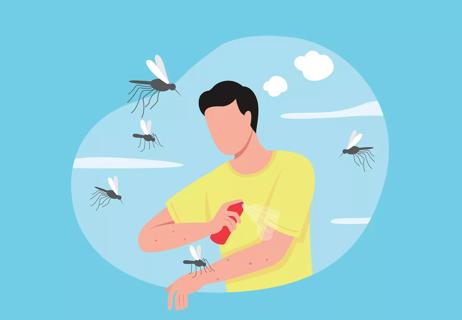ACHOO syndrome is your trigeminal nerve’s exaggerated response to bright light

Summer lovin’, had me a … ah … achoo!
Advertisement
Cleveland Clinic is a non-profit academic medical center. Advertising on our site helps support our mission. We do not endorse non-Cleveland Clinic products or services. Policy
Sneezing your face off probably wasn’t on your summer vacation bucket list, but for some of people, it’s hard to avoid: They sneeze when they look at the sun. In fact, some people do it every time they see the sun, even in the dead of winter. Most sneeze several times in a row before it stops.
There are many names for this phenomenon, like “sun sneezing,” “photic sneeze reflex,” “photoptarmosis” and, no joke, “photosneezia.” But the best name, without a doubt, is “autosomal dominant compelling helio-ophthalmic outburst syndrome.” That’s right: ACHOO syndrome!
Fun names aside, why does sunlight turn some of us into sneeze factories? And is there anything you can do to stop it? We talked to allergist David Lang, MD, to find out.
“Sneezing is a naso-expulsive response. The sneeze is to the nose what a cough is to the lung,” Dr. Lang explains. The average sneeze is a response to nasal irritation of some sort, such as an attempt to expel potentially infectious germs. But that’s not what’s happening in ACHOO syndrome.
“Solar sneezes are an exaggerated response that occurs with exposure to bright light,” Dr. Lang says.
It all starts with crossed wires involving your trigeminal nerve, a facial nerve that go to your eye and nose. When a bright light hits your eyes, your pupils constrict … and ACHOO!
Advertisement
This reflex usually happens on initial exposure to the sun or a very bright light. It’s most common when moving from a dark to a light environment, like when you drive out of a tunnel or walk from a dark room to a sunny patio. Some people even react to flash photography.
ACHOO syndrome is genetic, but researchers haven’t yet pinpointed the genetic variation responsible. We’re also not sure if it’s possible to acquire the condition.
Sneezing at the sun sounds like a pretty odd thing to do, so you might be surprised to hear that ACHOO syndrome is fairly common. Exactly how common is still up for debate.
There aren’t a lot of studies on the photic sneeze reflex — and the studies that do exist tend to have very small sample sizes. But, taken together, those studies suggest that somewhere between 15% and 30% of us are solar sneezers. ACHOO syndrome is a dominant trait, which means you have a 50% chance of inheriting the photic sneeze reflex if one of your biological parents has it.
According to a 1995 study on photic sneezing, the condition is more common in people who are white, especially women. Having a deviated septum may also have something to do with it.
It’s worth noting that how severe a photic sneeze reflex is can vary from person to person. Some people sneeze uncontrollably (and multiple times in a row) with sun exposure, even in the dead of winter! For other people with the reflex, sun sneezes only happen occasionally. As a result, it’s quite possible to inherit the ACHOO syndrome and never realize you have it.
While it can sometimes feel like you’re about to expel your brain through your nostrils, the act of sneezing itself isn’t dangerous. What is dangerous: Sneezing uncontrollably in high-risk situations. If you have a sneezing fit while driving or operating heavy machinery, your chances of an accident go way up.
It’s also common for people with a photic sneeze reflex to sneeze in response to a bright light shining in their face … which could happen during dental or eye procedures. Some photic sneezers also react to certain kinds of anesthesia, like propofol.
A photic sneeze reflex can also be triggered by having your eye injected with anesthetic for surgery. The injection — like sudden exposure to sunlight — stimulates your trigeminal nerve. We probably don’t need to explain why that could turn out badly.
At this point, you’re probably wondering what (if anything) can be done about ACHOO syndrome. There’s no specific treatment for solar sneezing, but Dr. Lang says there are three different things that may be worth trying:
Advertisement
Another way to reduce the risk: Let your provider know you have ACHOO syndrome whenever you’re going under the knife — or under the light. It’s especially important to tell your ophthalmologist, optometrist and dentist, too, because bright lights are critical to exams and procedures.
And if you’re having surgery that requires anesthesia of any kind, let your surgeon, anesthesiologist and nurses know you have ACHOO syndrome, just like you would tell them about allergies to medications. It may not matter for the procedure you’re having, but it’s always better to be safe than sorry.
If you sneeze uncontrollably when you see the sun or a bright light shines in your eyes, you probably have a photic sneeze reflex, or ACHOO syndrome.
While it can be frustrating (and risky in certain situations) a photic sneeze reflex isn’t something to get concerned about. It’s actually quite common. And it’s the perfect excuse to buy a pair of fancy shades!
Advertisement
Learn more about our editorial process.
Advertisement

If you’re sneezing, you’re definitely awake — you just don’t realize it

It’s best to allow yourself to sneeze naturally, and cover your mouth and nose with a tissue or turn into your elbow to help prevent the spread of germs

Most antihistamines, like Zyrtec, are OK, but avoid decongestants for at least the first trimester

Several conditions, like vitiligo and fungal infection, can cause a loss of pigmentation, leading to white spots or patches on your skin

Allergies, indigestion and the effects of gravity can all mess with your nose at night

Open the windows, keep a clean house and consider putting in preventive features like carbon monoxide detectors

Keep ‘mozzies’ at bay by avoiding scented body products, beer and certain colored clothes

Wearing a scarf, adjusting your outdoor activities and following your asthma treatment plan can help limit breathing problems

Your diet in the weeks, days and hours ahead of your race can power you to the finish line

When someone guilt trips you, they’re using emotionally manipulative behavior to try to get you to act a certain way